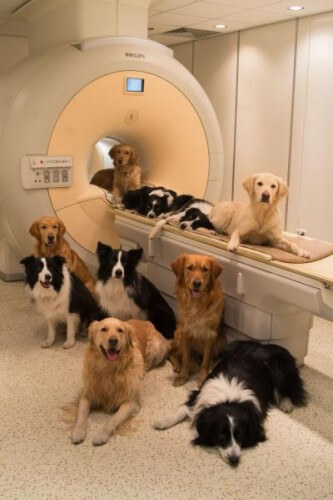"Dogs and humans share the same social environment" says Attila Hendix of the comparative ethology research group MTA-ELTE in Hungary. "Our findings led us to hypothesize that they use the same brain mechanisms to process social information. This may provide an explanation for the success of vocal communication between the two sexes."

The first study to compare the brain functions of humans with another non-primate animal showed that dogs have a dedicated sound recognition area in their brains, just like humans. Dogs' brains, like humans', are also sensitive to acoustic cues of emotion. This is according to a study published last night in the journal Current Biology.
According to the findings, the researchers estimate that the vocal tract developed at least 100 million years ago, the age of the last common ancestor of humans and dogs. They also offer new insight into the unique bond with our best friends in the animal kingdom and offer an explanation for the behavioral and neural mechanisms that have made this alliance so effective for tens of thousands of years.
"Dogs and humans share the same social environment" says Attila Hendix of the comparative ethology research group MTA-ELTE in Hungary. "Our findings led us to hypothesize that they use the same brain mechanisms to process social information. This may provide an explanation for the success of vocal communication between the two sexes."
Andix and his colleagues trained 11 dogs to rest without movement in an fMRI device. This allowed them to run neuroimaging experiments on both dogs and human volunteers, something that had never been done before. They recorded the brain activity of both humans and dogs as the subjects listened to about 200 canine and human sounds, ranging from whining and crying, to happy barking and human laughter.
The simulations showed that the brains of humans and that of dogs contain a vocal region in identical sites. Not surprisingly, the vocal tract in dogs responds more strongly to the voices of other dogs, while humans respond strongly to the voices of other humans.
The researchers also uncovered a surprising similarity between the ways in which the dogs' and humans' brains process emotionally charged sounds. In both sexes, an area near the primary auditory cortex lit up more when happy voices were heard compared to sad voices. Andicks says the researchers were particularly surprised by the identical response to emotions in both sexes.
Still, there are also differences. In dogs, 48% of all sound-sensitive brain areas responded more strongly to sounds other than speech. This contrasts with humans where only 3% of the brain's sound-sensitive areas showed a response to other sounds compared to speech sounds.
According to the researchers, their research is the first step toward understanding how dogs can be so good at attuning to the emotions and feelings of their human owners.
"This method offers a completely new way of neural research in dogs" Andix said. "For the first time, we began to understand how our best friends see us and navigate our social environment."

11 תגובות
"of their human owners" - the dog has an owner. I hope that women will finally understand that they are not objects or dogs and do not have a "husband".
By the way, how about changing it and instead of "ancestor", write once "ancestral mother"?
Not true. There are many reasons. They don't feel part of the country if this is the main reason. While there is a common secularist, from the age of zero he is brainwashed that he is part of the state.
But even then the majority will not risk it and will stay in the rear.
If Lapid talks about equalizing the burden then everyone should go and put their lives in equal danger.
point
Here we agree. The only reason the ultra-orthodox are not ready for their sons to serve in the army is because they are afraid of losing control. The whole story of their teachings and their art is simply a lie.
Now you start talking like some religious person who is being threatened for the belief in God that he grew up with.
This leads me to think that the actual war that exists today between the religious and the secular is about control.
point
You are against government, aren't you?
Now we started with demagoguery.
Who said the government is to blame for everything?
point
I agree with you. This is the reason for the emptiness in many people. And the emptiness is the reason to think that the government is to blame for everything.
Need to fix, man's best friend is the iPhone. not the dog